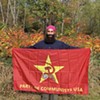Jeffrey Gettleman, this year's Pulitzer Prize winner for international reporting, says that as a reporter for a highly influential newspaper he gets "a lot of crap" regardless of what he's writing about. But no critic can justly accuse this 41-year-old New York Times East Africa bureau chief of embodying the stereotype of the journalist as a lazy cynic.
Gettleman, who's speaking at St. Michael's College on Monday evening (7 p.m. in McCarthy recital hall), regularly risks his life reporting from lethal and largely ignored corners of Africa because "I want to try to help people who are experiencing famine or really horrific abuses."
As the Pulitzer panel noted in its award citation, Gettleman writes "vivid reports, often at personal peril." He has covered the Islamist insurgency in Somalia — generally considered the most dangerous place in the world for journalists — atrocities carried out by the maniacal Lord's Resistance Army in central Africa, and albinos murdered in Tanzania because their body parts are believed to confer magical powers. He composes these dispatches in uncommonly graceful prose that can remain lodged in readers' memories long after the day's newspaper has been tossed in the recycling bin.
A sampling of his stories is available on the Pulitzer website: http://www.pulitzer.org/works/2012-International-Reporting.
Seven Days caught up with by phone with Gettleman, who was in Los Angeles on Thursday.
SEVEN DAYS: You've been heading the Times bureau in Nairobi, Kenya, for a while now. Are you going to be rotated out of there soon? Do you want to leave?
JEFFREY GETTLEMAN: I've been in Nairobi since 2006. The Times does have an unspoken practice of having a correspondent spend four or five years at a post and then moving on. But that won't necessarily happen with Nairobi. We really like it there. My wife has a good job [with the State Department] and both our kids were born there. The older one, who's 3, is starting to learn Swahili. There's nowhere else I want to go at this stage of my career.
SD: What about security concerns? Al-Shabaab [the Islamist insurgency in Somalia] has been setting off bombs in Nairobi. And there's also the day-to-day crime problems in a city a lot of expats refer to as Nairobbery.
JG: Of course I worry about something horrible happening to us, but we don't let that impact our lives too much. Nairobi is actually a beautiful city in a very interesting part of the world.
SD: Some of your best reporting has been from Somalia. You were going there a couple of years ago when there were no other Western journalists on the scene because the country was so totally anarchic. Can you say why you did that?
JG: I feel very committed to the Somali people. I keep going back there a lot because Somalia has been so neglected for so many years. There's a great deal of suffering there, most of it totally preventable. So I try to shine a light on a place that's not getting the attention it should be getting.
Somalia produces more news than any country of its size in the world. Somalia also exports its problems: Shabaab, pirates, famine. It's an important place in an increasingly important region.
I also feel strongly about Somalia because of what happened there to Dan Eldon, who was a good friend of mine. [Eldon, an English photojournalist, and three colleagues were beaten and stoned to death in 1993 by a mob in Mogadishu, the Somali capital, enraged by a raid carried out as part of a U.S.-led military intervention.]
He was the reason I went to East Africa at age 18 from suburban Chicago, which is where I grew up. We spent months traveling all over East Africa, and I fell in love with it. I knew I wanted to work there.
SD: So that's how your journalism career began?
JG: No. First I went to Cornell where I did study Swahili. After that, I wanted to work for an aid agency. I had no interest in working for a newspaper because I didn't feel passionate about journalism. But the aid work wasn't all I had thought, so I did finally get a journalism job at age 25, which was sort of late.
[Gettleman started out as a police reporter for the St. Petersburg Times. In 1999, he became a general-assignment reporter for the Los Angeles Times and later a war correspondent in Afghanistan and the Middle East. Gettleman joined the New York Times in 2002. He and photojournalist Lynsey Addario were abducted by militants in the Iraqi city of Fallujah in 2004 and released unharmed after several hours.]
SD: What's it like to work in Africa for the New York Times?
JG: It's great; it's a dream job. There's a lot of pressure, and the expectations are very high. You take a lot of crap from people because your work is so visible. You're going to be criticized no matter what you do, so you have to develop a really thick skin.
The Times offers a great platform because it does believe in its mission of presenting the world to its readers. The Times still has three offices in Africa, for example. There aren't many news organizations making that kind of commitment.
SD: Say something about your approach to reporting.
JG: I want to focus on and tell stories no one else is telling. An example is the Ogaden region of Ethiopia where I reported from in 2007 — a time when nobody was visiting there. Ethiopia was brutalizing its own people in the Ogaden, and the Ethiopian government gets hundreds of millions of dollars in aid from the U.S. It was a story that had to get out.
I do risk my life a lot in doing this job. It's not really about the glory, though that can be nice. It's more that I want to try to help people who are experiencing famine or really horrific abuses.
I try to write vividly and to move people. I don't want to write something generic, and at the same time I try not to be melodramatic. I try to give people the honor they deserve.
SD: Do you have any connection to Vermont?
JG: I've been on vacation there a couple of times but I don't know much about it. The woman who invited me to talk there [Laurie Gagne, head of the peace and justice program at St. Michael's] is very passionate about the Congo. That was really the driver.

















































